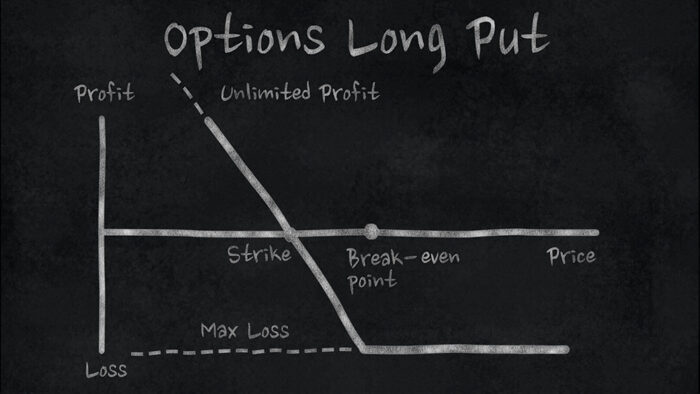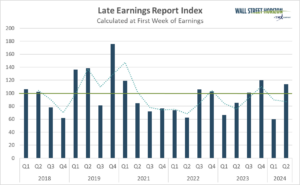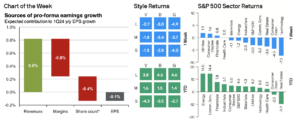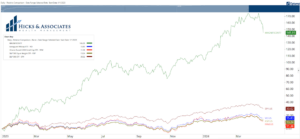Key takeaways
Specialty banks in the spotlight
The market’s focus is on smaller, regional financial institutions with specialty lending businesses.
Banks appear well-capitalized
The US banking system appears to be significantly better capitalized than it was in past crises, including 2008.
Long-term focus
I would remind long-term investors that these types of events have historically created buying opportunities.
Policy tightening cycles almost always end with accidents. The savings and loan crisis in the early 1990s, the “tech wreck” in the early 2000s, and the housing crisis in 2008 each commenced following a series of US Federal Reserve interest rate hikes designed to ease inflation. It’s why the market has been so focused on inflation for the past year. If inflation proved sticky, then the Fed would have to continue to raise interest rates, growth would deteriorate, and the risk of crises would rise. Alas, concerns are now being validated.
This week, Silicon Valley Bank and First Republic have emerged as the first cases of banks with business models and balance sheets that are ill-prepared for a rising interest rate environment and the ever-growing risk of a recession. Are they the proverbial canaries in the coalmine for the US banking system?
Smaller specialty banks in the spotlight
Before we start conjuring images of old-fashioned bank runs of yore, let’s look at what is currently happening. The market’s focus is on smaller, regional financial institutions with specialty lending businesses. For example, Silicon Valley Bank1 has a niche business in financing technology start-ups, which are now having challenges in raising money as the venture capitalists who had been funding them have become more risk averse. The start-ups are raising cash by pulling deposits from Silicon Valley Bank, which is being forced to sell assets to meet the rush for deposits. Silicon Valley Bank is primarily selling US Treasury bonds, which had lost significant value, resulting in greater losses than the bank had accounted.
To put this into perspective, Silicon Valley Bank is one-tenth the size of JP Morgan, the nation’s largest bank.2 Nonetheless, it’s never a good sign when banks are forced to raise money on short notice. Investors, smelling blood, then turn their attention to the next bank exposed to interest rate risk and specific credit risk, and then the next. First Republic Bank, which has significant exposure to the coastal real estate markets appears to be next on the list. For what it’s worth, First Republic is one-twentieth the size of JP Morgan.3
Overall, US banks appear well-capitalized
The better news is that the US banking system, following a prolonged period of stringent oversight in the aftermath of the Global Financial Crisis, appears to be significantly better capitalized than it was in past crises, including 2008.4 The Federal Deposit Insurance Corporation estimates that the banking system, in aggregate, is well positioned to withstand the potential losses looming.
These banking episodes have tended to persist until there is a necessary policy response. The first rules in central banking are 1) do no harm and 2) protect the banking system. Interest rates are currently plunging as expectations for future rate hikes are being reined in.5
A long-term focus
To the long-term investors, it’s my obligation to remind that these types of events have historically created buying opportunities. Many investors who allocated money to the broad US equity markets during the savings and loan crisis, the tech wreck, and the housing crisis were ultimately well served.6
Footnotes
- Background on Silicon Valley Bank’s business challenges sourced from The Verge, “Another tech bank is in deep trouble — but not because of crypto,” March 10, 2023
- Source: US Federal Reserve, 2/28/23
- Source: US Federal Reserve, 2/28/23
- Source: Federal Deposit Insurance Corporation, 2/28/23
- Source: Bloomberg, 3/10/23. As represented by US Treasury yields across maturities and Fed Funds Futures. Fed funds futures are financial contracts that represent the market’s opinion of where the federal funds rate will be at a specified point in the future. The federal funds rate is the rate at which banks lend balances to each other overnight.
- Source: Bloomberg, 3/9/23. As represented by the S&P 500 Index. The S&P 500 was up 108% from 1990 to 1995 (following the savings and loan crisis), 313% from 1999 to 2023 (following the tech wreck), and 43% from 2008 to 2013 (following the housing crisis).
—
Originally Posted March 10, 2023
What investors need to know about the banking turmoil rattling markets by Invesco US
Important information
NA2786360
This does not constitute a recommendation of any investment strategy or product for a particular investor. Investors should consult a financial professional before making any investment decisions.
All investing involves risk, including the risk of loss.
Past performance does not guarantee future results.
Investments cannot be made directly in an index.
The S&P 500® Index is a market-capitalization-weighted index of the 500 largest domestic US stocks.
The opinions referenced above are those of the author as of March. 10, 2023. These comments should not be construed as recommendations, but as an illustration of broader themes. Forward-looking statements are not guarantees of future results. They involve risks, uncertainities and assumptions; there can be no assurance that actual results will not differ materially from expectations.
Disclosure: Invesco US
This does not constitute a recommendation of any investment strategy or product for a particular investor. Investors should consult a financial advisor/financial consultant before making any investment decisions. Invesco does not provide tax advice. The tax information contained herein is general and is not exhaustive by nature. Federal and state tax laws are complex and constantly changing. Investors should always consult their own legal or tax professional for information concerning their individual situation. The opinions expressed are those of the authors, are based on current market conditions and are subject to change without notice. These opinions may differ from those of other Invesco investment professionals.
NOT FDIC INSURED
MAY LOSE VALUE
NO BANK GUARANTEE
All data provided by Invesco unless otherwise noted.
Invesco Distributors, Inc. is the US distributor for Invesco Ltd.’s Retail Products and Collective Trust Funds. Institutional Separate Accounts and Separately Managed Accounts are offered by affiliated investment advisers, which provide investment advisory services and do not sell securities. These firms, like Invesco Distributors, Inc., are indirect, wholly owned subsidiaries of Invesco Ltd.
©2024 Invesco Ltd. All rights reserved.
Disclosure: Interactive Brokers
Information posted on IBKR Campus that is provided by third-parties does NOT constitute a recommendation that you should contract for the services of that third party. Third-party participants who contribute to IBKR Campus are independent of Interactive Brokers and Interactive Brokers does not make any representations or warranties concerning the services offered, their past or future performance, or the accuracy of the information provided by the third party. Past performance is no guarantee of future results.
This material is from Invesco US and is being posted with its permission. The views expressed in this material are solely those of the author and/or Invesco US and Interactive Brokers is not endorsing or recommending any investment or trading discussed in the material. This material is not and should not be construed as an offer to buy or sell any security. It should not be construed as research or investment advice or a recommendation to buy, sell or hold any security or commodity. This material does not and is not intended to take into account the particular financial conditions, investment objectives or requirements of individual customers. Before acting on this material, you should consider whether it is suitable for your particular circumstances and, as necessary, seek professional advice.



























